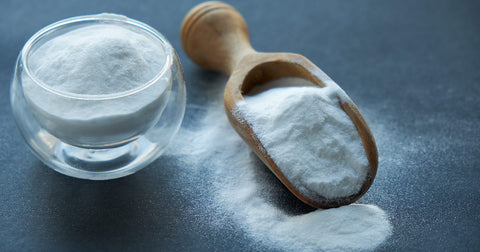Dealing with constipation is never fun. While reaching for that box of baking soda in your kitchen cabinet might seem tempting, is it truly a reliable remedy? Let's explore what the research says, how baking soda might work, and why other approaches might be better for long-term relief.

How Baking Soda for Constipation Is Thought to Work
Baking soda (sodium bicarbonate) is alkaline, the opposite of stomach acid. When ingested, this alkaline solution reacts with stomach acid, neutralizing it and producing carbon dioxide gas. The theory is that:
1. Gas Production: The resulting gas could create pressure in the intestines, stimulating movement and potentially leading to a bowel movement
2. Electrolyte Shift: Sodium bicarbonate also alters the balance of electrolytes in your gut, potentially drawing water into the intestines, softening stool.
The Research Says... Not Enough Proof
While these mechanisms sound plausible, there's little scientific evidence backing the use of baking soda for constipation relief. Most studies have focused on its use for heartburn or indigestion, not constipation itself.
How Much Baking Soda and Water Should I Drink for Constipation?

There is no recommended or medically endorsed dosage for baking soda as a constipation remedy. Recipes found online often suggest a teaspoon in a glass of water, but this can be dangerous for some people.
Risks and Precautions with Baking Soda
- Electrolyte Imbalance: Large amounts of baking soda can disrupt your electrolyte levels, causing serious side effects like irregular heartbeat and muscle weakness.
- Not for Everyone: Those with kidney problems, high blood pressure, or on certain medications should never use baking soda without their doctor's guidance.
Immediate Constipation Relief at Home: Better Options
While baking soda's effectiveness is questionable, plenty of other remedies have stronger evidence:
- Hydration: Plain water is your best friend! Aim for 8+ glasses a day.
- Fiber Boost: Gradually increase dietary fiber (fruits, veggies, whole grains).
- Movement: Exercise or even a gentle walk can stimulate your bowels.
- Natural Laxatives: Prunes or prune juice are a classic remedy, but talk to your doctor if constipation is chronic.
Could a Food Intolerance be Causing Your Constipation?
Yes! Hidden food sensitivities can trigger inflammation in your gut, leading to chronic constipation. Our food intolerance test kit can help uncover these triggers, allowing you to modify your diet for lasting relief.
Get Personalized Guidance

If you're struggling with constipation, seeking professional help is crucial. A doctor or nutritionist can:
- Rule out serious underlying causes.
- Help develop a safe and effective treatment plan.
- Guide you on dietary changes and lifestyle modifications for long-term relief.
While baking soda might offer temporary relief for some individuals, its effectiveness is not backed by strong evidence, and it carries potential risks. Focusing on healthy habits and getting professional guidance is a safer path to digestive health.
Disclaimer: This information is for educational purposes only and is not a substitute for medical advice. Always consult with a healthcare professional before trying new remedies.
Frequently Asked Questions:
1. Is baking soda a safe and effective way to relieve constipation?
While baking soda may offer temporary relief for some, its effectiveness for constipation is not scientifically proven. It can also cause serious side effects if not used correctly. It's best to consult with a doctor before trying this remedy.
2. Why do people think baking soda might help with constipation?
The theory is that baking soda's reaction with stomach acid creates gas, which could potentially stimulate bowel movements. It also might alter electrolytes, drawing water into the intestines and softening stool. However, research supporting these claims is limited.
3. Are there any risks associated with using baking soda for constipation?
Yes. Excessive baking soda intake can disrupt your electrolyte balance, leading to serious side effects like irregular heartbeat and muscle weakness. People with kidney problems, high blood pressure, or those taking certain medications should avoid it.
4. What are safer and more effective ways to relieve constipation at home?
Increase your water intake, gradually add more fiber to your diet (fruits, vegetables, whole grains), and engage in regular physical activity. If needed, your doctor can recommend over-the-counter laxatives or stool softeners.
5. I've tried everything, and my constipation won't go away. Could it be something else?
Chronic constipation could signal an underlying medical condition or a food intolerance. If lifestyle changes and over-the-counter remedies don't work, it's important to consult your doctor for further evaluation.


.png?v=1737390083)
.png?v=1737187409)


